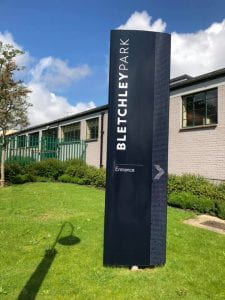When visiting London, England we analyzed the British idea of WWII being a “People’s War.” This idea of a “People’s War” meant a war that was fought by everyone from ordinary people/civilians to the soldiers fighting on the war front. Everyone played their part and did what they needed to do for their country and for victory. I think Bletchley Park serves as a slight contradiction to the idea of a People’s War; highlighting the stark differences in experiences of the various people involved in the war effort.
Bletchley Park is an estate north of London that served as the headquarters of “Ultra” and Code-Breaking Intelligence during World War II. Hidden from the public, intelligence agents used enigma machines and other varieties of code-breaking technologies, pieces of enemy code were taken from building to building by code runners and deciphered further. Knowledge obtained at this site would reveal German plans and formations and also helped put the allied forces at an advantage against the Germans.
Recruitment for positions at Bletchley came from various avenues in England. Approximately three-fourths of the codebreakers at Bletchley were women who were recruited from Women’s Services such as the Women Royal Navy Service, Women‘s Auxiliary Air Force, etc. Further recruitment came from both networking and trusted aristocratic relationships, as well as, from newspapers and contests in which ordinary civilian winners were called in for interviews. These civilians had no idea where they were going or what they would be doing until they got to Bletchley. These ordinary people left their lives behind for new opportunity and new scenery, without a clue of what they were in for.
When visiting this site, it was interesting to compare my original thoughts of what the compound would look like versus the reality. I had envisioned a desolate area, clearly affected by wartime, with small sheds as huts that sat extremely close together. Instead, Bletchley was a beautiful estate, with a pond, a mansion and significantly larger buildings than I expected. When visiting Bletchley Park, you would not think that an enormous secret code-breaking program was happening. Other than the “huts” where the code-breakers worked, the grounds looked more like a country club than a military compound. While Bletchley made significant contributions to the war effort, it does challenge the notion of WWII as being a “People’s War” due to the fact that these code-breakers and everyone else involved in Bletchley were pretty much isolated from the war, unlike the city of London just to the south.
The recruitment of ordinary, everyday citizens using magazines and puzzle contests in newspapers definitely contributes to this ideal, but the fact is, Bletchley Park, a significant force in the success of WWII, was actually over an hour outside of the city of London. London at the time was being barraged with bombs during the Blitz and was in a state of despair. Bletchley, while conditions were still not the best, still managed to escape most of the fallout of the war, unlike if they were in the heart of London. With the differing experiences in wartime, I believe that the lines of what defines a “People’s War” seem to blur.



